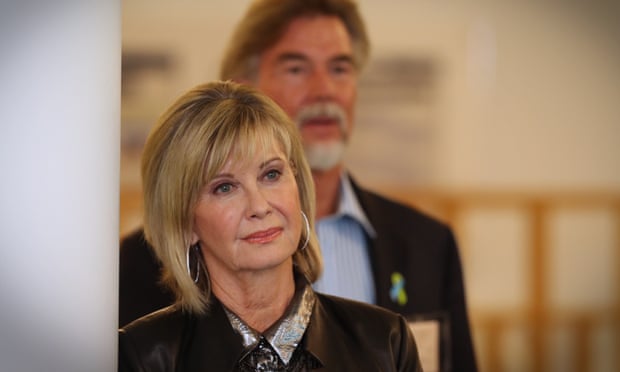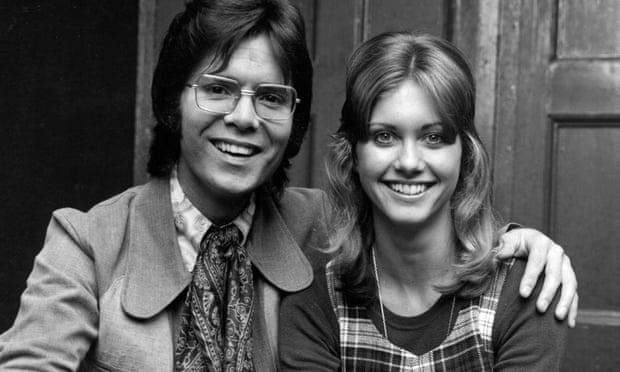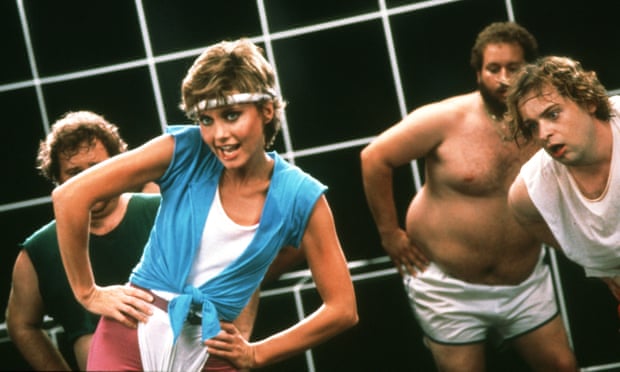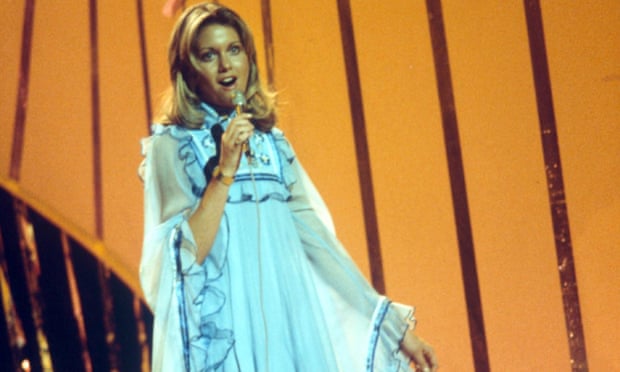The singer and actor Olivia Newton-John, who has died aged 73 after suffering from cancer, had a ready riposte for anyone who called her “Miss Goody Two-Shoes from Australia”. Despite her Melbourne accent, she had been born in the UK, in Cambridge, and therefore – as she informed a US television audience in 1980 – she was technically “Miss Goody Two-Shoes from England”. Either way, the quip was not far off the truth. Through a career that included 100m album sales and a starring role in Grease (1978), one of the most successful musicals in film history, she was the entertainer least likely to court controversy. Though she had passionate views on the environment and cancer research, she rarely expressed strong opinions on other subjects or engaged with negative criticism.
During the early 1970s in particular, she was one of the few young stars who were more popular with parents than with their children. She was once described by Rolling Stone magazine as “a sweet, innocent, 70s version of Doris Day”. However, in the late 70s, after a decade of soft-pop hits, she orchestrated one of the music industry’s most unexpected makeovers.
Her winsome denim wardrobe was replaced with black leather, and breezy album sleeves (often shot in meadows, playing up her girl-next-door freshness) with dark-toned, come-hither shots. The reinvention was mightily helped along by her performance as Sandy, the good-girl-gone-baddish in Grease, and the pot was stirred further by the 1981 hit Physical (“I want to get physical … Let me hear your body talk,” it implored). Meanwhile, her wanton screen chemistry with her Grease co-star John Travolta was exploited to produce two No 1 singles, Summer Nights and You’re the One That I Want.
Her career duly rocketed, with Physical spending 10 weeks at the top of the US chart, but Newton-John never seemed entirely comfortable as a vamp. Continuing to foster the notion that she was pop’s safe pair of hands, she commented: “People don’t want to hear that you’re nice, but that’s what I am. In fact, I’m pretty boring.”
More likely, she was just eager to please. A telling example involved her appearance in the 1974 Eurovision Song Contest, in which she represented Britain. It was not until years later that she felt able to admit that she had hated not just the deplorably bouncy song – Long Live Love, which came fourth, the top spot going to Abba with Waterloo – but the frothy dress she had worn. She had wanted trousers, but when the public were polled about it they voted for the dress, and she was unwilling to disappoint.
That kind of deference made her enormously popular with conservative audiences in the US, where she had her greatest success, but it did not do much for her credibility. For the rest of her life, during which she also campaigned for animal rights and founded the Olivia Newton-John Cancer Wellness and Research Centre in Melbourne, she was defined by her emollience. In Travolta’s opinion: “Olivia is basically sweet and lovely.”

She was the youngest of three children born to Irene (nee Born) and Brinley Newton-John. The family moved from Britain to Australia in 1954 when Brinley, a teacher, accepted a post at the University of Melbourne. Bound by the Official Secrets Act, he kept his children in the dark about his earlier career – it was not until Olivia was an adult that she discovered that during the second world war her father had been an MI5 officer assigned to the Enigma codebreaking unit at Bletchley Park. Her maternal grandfather was the physicist Max Born, a Nobel laureate.
Olivia wanted to be a vet, but doubted her ability to pass the science exams, and turned instead to her other interest, performing. Regular spots under the name Lovely Livvy followed on Australian radio and television, and at 16 she won a TV talent show. The prize was a trip to London, where she arrived in 1964. Two years later, her debut single, Till You Say You’ll be Mine, failed to reach the chart, and her next venture, a singing duo formed with a fellow Australian, Pat Carroll, was also unsuccessful. She was recruited for a Monkees-inspired pop group called Toomorrow, who got as far as releasing a flop 1970 “space musical” film and two singles.
Her fortunes changed in 1971, when she met Cliff Richard, then hosting his own TV variety show, and was invited to become a regular guest singer. Bruce Welch and John Farrar, members of Richard’s backing band the Shadows, were taken by her girlishly beguiling voice and invited her to record demos in their studio. She was essentially a pop singer, but Welch and Farrar felt that her ability to deliver songs with sweet pathos could be used to good effect on country-oriented tracks.
They were right. One of the 1971 demos was a cover of Bob Dylan’s If Not for You, suitably zazzed up with slide guitar, and it became her first hit. Several more singles and two albums followed in the next two years; one track, an inordinately uptempo version of the murder ballad Banks of the Ohio, did well in the UK and Australia.
Her real breakthrough came in 1973 with the song Let Me Be There. Aimed directly at country playlists, Newton-John’s vocal twang belied her Australian roots. It secured her that year’s Grammy award for best female country vocal performance, and the string of hits that followed, including her signature song, I Honestly Love You, won her the female vocalist of the year trophy at the 1974 Country Music Association awards.

Newton-John’s wholesomeness, abetted by undeniably good tunes, made her a natural on country radio, but some of Nashville’s biggest names were incensed at the notion of an Australian invading their territory, and formed an association dedicated to keeping pop singers out of their genre. It did not stop Newton-John from winning several other major country trophies.
Remarkably, she later claimed to have been unaware of the backlash. “I was travelling and touring, and I heard about it after, and heard that Dolly [Parton] and Loretta [Lynn] had backed me up, so I had great support.”
It was more difficult to win over the then-powerful (and overwhelmingly male) rock music press, which detested her apparent lack of “authenticity”. It dished out particularly peevish coverage for years, carping at what the NME called “her limited stage choreography, her terrible linking, her overscrubbed artificial look of perfection and polish”. Others focused on her looks. “What female singer would ya like most to sit in yr lap?” asked the US rock magazine Creem. “Connie Francis? (too old) Cher? (too bananas). Answer: Olivia!”
Privately, she resented the criticism, but never responded. There was no need. The hits were still coming – some, such as If You Love Me (Let Me Know), are staples on nostalgia stations to this day. There were more awards, including another three Grammys, and in 1979 being made an OBE. But sales were tailing off by the time she was cast in Grease as the virginal Sandy Olsson, whose purity satirised the 1970s’ nostalgia for the 1950s.

She was initially hesitant to accept, because she was 29 and would be playing a 17-year-old: “I was very conscious of my limitations.” Even so, she negotiated equal billing with Travolta and a percentage of the proceeds in return for a bargain-basement $125,000 fee.
Grease’s enormous success, and the warm reviews for her own performance, reinvigorated Newton-John’s career. It paved the way for another departure – her role as a reincarnated Greek muse in the 1980 film Xanadu. She received middling reviews but every other aspect of the film was panned, except for its disco-oriented soundtrack. From it came two major (and excellent) Newton-John singles, the title track and Magic. The song and album Physical followed later that year. The LP sold 10m copies, while the video for the single, which had Newton-John in then-novel aerobics gear, picked up a Grammy.
Physical proved to be her commercial high-water mark, with none of her subsequent projects coming close to its success. Box-office gold was not rekindled when Newton-John and Travolta teamed up again for a poorly reviewed romcom, Two of a Kind (1983), and a chain of Australian-themed clothes shops that she founded the same year went bankrupt in 1992. That year, she was diagnosed with breast cancer.
After successful treatment, she released several albums with a healing theme. In 2017 Newton-John discovered the cancer had returned. Part of her treatment took place at the Melbourne cancer research centre she had helped to fund in 2008, and the Olivia Newton-John Foundation Fund supports research into plant-based treatments for cancer. Her autobiography, Don’t Stop Believin’, was published in 2018, and two years later she was appointed a dame.
Newton-John’s first marriage, in 1984, to the actor Matt Lattanzi, ended in divorce in 1995. Her partner from 1996 onwards, the cameraman Patrick McDermott, was lost at sea and presumed drowned in 2005. Newton-John’s second husband, John Easterling, whom she married in 2008, and her daughter, Chloe, from her first marriage, survive her.

